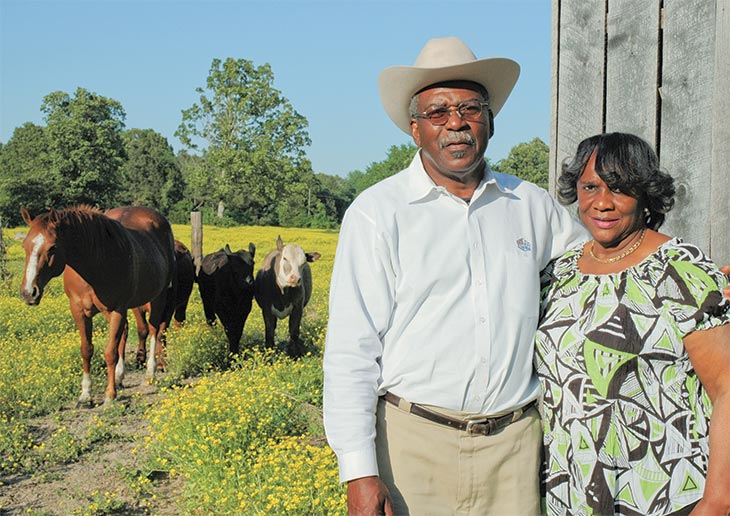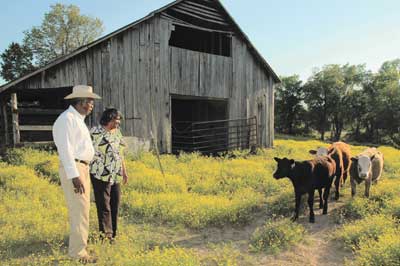Whenever talk turned to retirement plans, Joe Freeman’s colleagues with White Castle — a chain of fast-food restaurants in the Midwest — would scoff when he shared his.
“I said I was going to buy some dirt with the money I made from my profit-sharing funds,” he says. “One guy asked if I was going into the landscape business. I said no, that I was going back home to Mississippi, where I’d buy a farm and raise cattle. They always thought I was kidding.”
He wasn’t.

Joe and Rosemary Freeman
Photo by Sheryl Smith-Rodgers
After 40 years with White Castle, Freeman retired as a regional director in March 2006. True to his word, he and his wife, Rosemary, bought a 61-acre farm and built a new home near Senatobia, Miss., not far from where he was born in 1948.
In a classic case of “you can’t take the country out of the boy,” Joe Freeman retired from a career in Chicago to return to the farm life he left in rural Mississippi decades earlier.
“My parents were sharecroppers, and I was the youngest of four children,” Freeman tells. “We lived in a small house with no electric lights or indoor plumbing. I went to school in a one-room schoolhouse next to our church. One teacher taught all the kids, first grade through seventh. We didn’t get any coal from the state, so in the winter, we’d have class in the church and use the heater there.”
Hard Work Pays Off
To this day, Freeman remembers earning his very first nickel at age six.
“Ed Sanders, who owned the farm where my parents worked, was up in years and didn’t walk well,” he says. “So whenever the mailman came, I’d get the mail for him, then he’d give me a nickel. At the end of the week, I had a quarter for a Coke and ice cream.”
In 1959, the Freemans moved to another house with two electric lights. Within a few years, though, they’d move again. “Sharecropping was on the way out, and my mother was sick. So my sister, who lived in Chicago, called for us, and we moved there near the end of 1964.”
Acclimating to an urban high school took time, but Freeman soon excelled in his classes. He also landed a part-time job with White Castle, so he could make some extra money to take a young lady he’d met during summer school out on dates.
“As soon as I saw Rosemary, I knew she’d be my wife,” he says. The couple married in May 1967 and raised three sons: Joe Jr., Jeffery and Jamie.
Meanwhile, “as a senior, I’d planned to go to college and teach history,” he says. “But then I had a choice — either work as a supervisor with White Castle for $7,000 a year and a brand-new car, or go to college for four years and earn a teacher’s salary of $5,000.”
His decision to stay with White Castle proved to be a good one. Within two years, Freeman was promoted to a store supervisor in Chicago. From there, he moved up the ranks. “I worked in management for most of my 40 years with the company,” he says.
Heading Home
As the years went by, Freeman often talked about returning home. But no one believed he would follow through.
In 2003, he began laying the groundwork toward reaching his goal. “We bought a 20-acre farm near Tyro, where I grew up,” Freeman says. “The Mississippi Land Bank in Senatobia helped us finance the land.” Three years later — much to the surprise of friends and family members in Chicago — the couple partnered with the bank again, this time to purchase land east of Senatobia.

Joe and Rosemary Freeman check on a few young cattle from the herd they are building.
Photo by Sheryl Smith-Rodgers
“Branch Manager Joe Hill has a real love of the land, just like I do,” Freeman says. “We’re on the same page. So it was a good fit working with him and the Land Bank.
“My intention was always to raise cattle,” he continues. “So when this place came up for sale, we came down from Chicago to take a look. All Rosemary saw were the briars, but I saw potential.” They closed the deal in May 2006. A year later, the couple moved into their spacious new home.
A New Life Far From the City
Right away, Freeman set to work clearing bramble thickets, building fences and putting in ponds among the gently rolling hills. Never far from his side was Ditty Bite, his favorite cow dog.
“He and I would get up every morning and go probing around,” Freeman recalls. “Where the place hadn’t been cleared off, we’d peek and plan. We’d even go out in the rain, because then we saw how the water ran off. That’s how we figured out where to put the lakes.”
Their observations paid off. Within two months, rainwater filled up Freeman’s new lakes. They’ve since been stocked with crappie, bass, catfish and bluegill. Sadly, Ditty Bite died in 2009 (but he left behind three pups, two of which resemble him).
In his white Ford pickup — “a retirement gift to myself,” he admits — Freeman surveys the farm daily, usually armed with a “Joe blade” tool that he uses to whack weeds and branches. Tending 30 head of cattle keeps him busy, too.
“My plan is to have a registered Angus herd. During my first five years, I’ve bought what I could and built a ‘scrap’ herd with my Angus bull. At the end of five years, I’ll sell my herd and use the cash to buy registered Angus,” he says.
“When I started with White Castle, burgers sold for 12 cents,” Freeman adds. “When the company started in 1921, they sold for 5 cents. So I like to say, too — all this from just a nickel!”